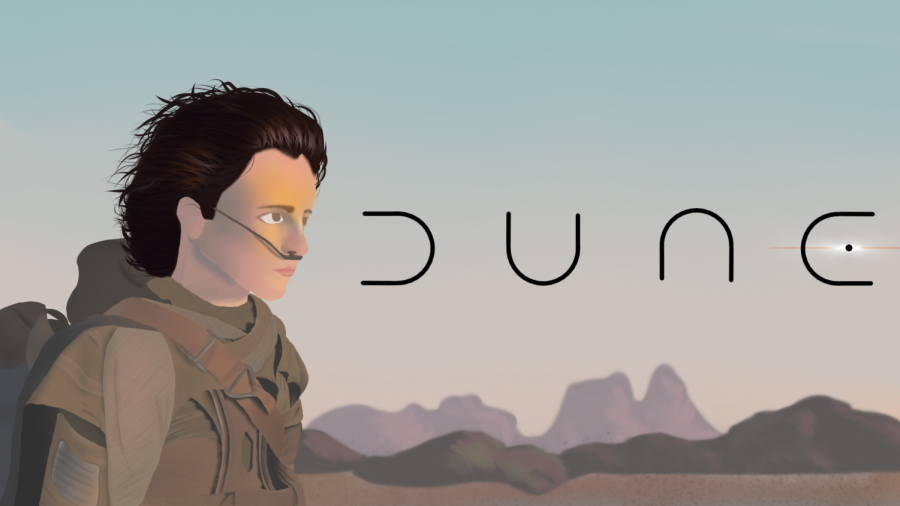Villeneuve’s “Dune” Well-Adapts the Sci-Fi Classic Into a Film
December 1, 2021
Rating: 4.5/5 Falcons
Arrakis; Dune; the Desert Planet. Denis Villeneuve’s 2021 adaptation of sci-fi classic Dune is as immersive as it is ambitious. The sweeping images of the barren desert world coupled with Hans Zimmer’s vivid soundtrack draws the viewer into an unfamiliar—yet human—universe. The novel Dune by Frank Herbert has proven hard to adapt to the big screen.
Nevertheless, Villeneuve successfully captures the complex universe Herbert dreamed up over 50 years ago. Dune takes place 10,000 years in the future, after the rise and fall of totalitarian artificial intelligence. Powerful houses composed of wealthy families each reside on planets under the ultimate rule of the empire.
In this feudal setting, the houses are vying for control of one planet, Arrakis, for its abundance of Spice—a psychoactive drug and crucial ingredient in interstellar travel. Giant native sand worms disrupt the harvesting of Spice, making it incredibly hard to obtain, thus more valuable. The Emperor has commanded House Atreides to replace another powerful—yet brutal—house, the Harkonnens, in the acquisition and export of the Spice. Finally, welling deep in the desert are the Fremen, a people who have long adapted to the unforgiving environment and who have lived under the hegemony of generations of the colonizing Houses.
Duke Leto of House Atreides and his partner Jessica, a member of the Bene Gesserit––a sisterhood dedicated to steering the course of human evolution––arrive on Arrakis with their son, Paul. Paul Atreides is caught in the politics of family lineage, the Bene Gesserit’s agenda, and represents the Fremen’s desire for freedom. Actor Timothée Chalamet perfectly embodies the complexity of Paul with a sharp and compelling effect. Rebecca Ferguson, as Paul’s mother, Jessica, poignantly portrays her character’s internal struggle between her love for Paul and her loyalty to the Bene Gesserit; the conflict between family and duty is a relatable sentiment that builds a parallel between another universe and our own.
Jason Momoa, as Duncan Idaho, is the master of arms for House Atreides, and the film’s standout. The levity he brings to an otherwise claustrophobic story is crucial to the story’s composure. The film evokes multiple themes, with colonization and resource extraction among the most prominent. Despite being set in the far future, Dune’s expansive politics are derived from European colonial imaginations.
The Atreides are pictured as the chivalrous and logical heroes arriving to a world in need. The Fremen are depicted through the lens of Orientalist stereotypes built up by Western colonizers. The amalgamation of these stereotypes—Fremen being bound by tradition, garbed in concealing fabric, and held in superstitious worry—makes the world building problematic and therefore difficult to believe.
Arriving on Arrakis, Paul is set up to be a possible savior for the Fremen. But Paul is from another world, he cannot realistically take their problems as his own. The film hints that the prophesied savior may not be the hero, but a victim of his family’s ambition. Denis Villeneuve beautifully articulates a complex story in a blockbuster art film that is well worth a theater watch.
This piece also appears in our November 2021 print edition.









